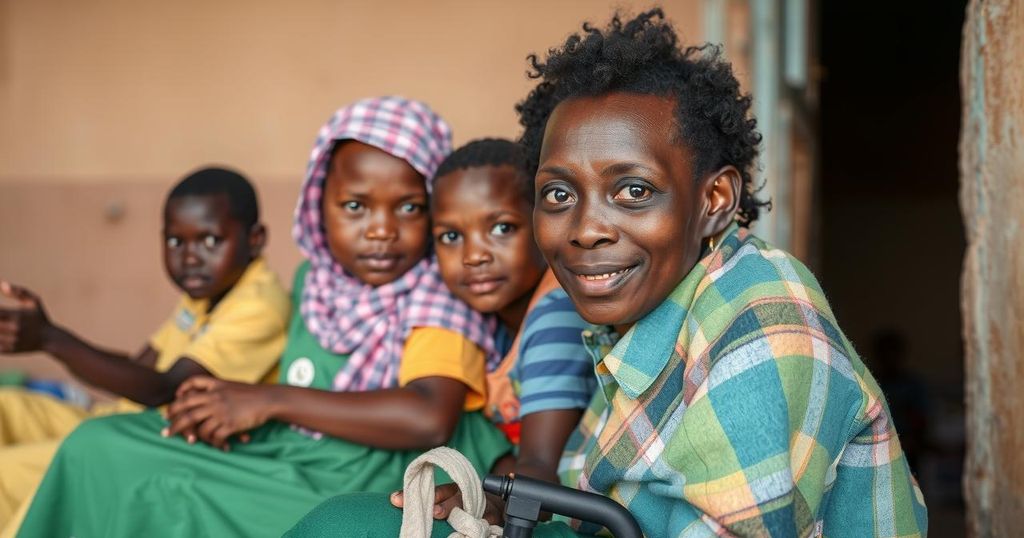Sudan Conflict Increases Demand for Disability Support in South Sudan
South Sudan is experiencing a surge of individuals with disabilities, primarily amputees, who are fleeing conflict in Sudan. With only three specialized orthopedic centers, the country faces immense pressure to provide comprehensive care. Notable figures like Ladu Jackson, an amputee footballer, exemplify the resilience of those affected. Organizations like the ICRC aid in rehabilitation efforts, while South Sudan ratifies legislation to support the rights of disabled individuals. The growing crisis underscores the urgent need for continual support and resources for this vulnerable population.
South Sudan is currently facing a growing influx of individuals with disabilities, particularly amputees, as victims from the ongoing conflict in Sudan seek assistance. This situation is significantly straining the limited resources of South Sudan, which has only three specialized orthopedic centers available to meet the needs of both its citizens and refugees. For Ladu Jackson, a 23-year-old amputee footballer, the journey from a tragic accident at a young age to becoming an inspirational athlete exemplifies the resilience many individuals exhibit.
After losing his left leg in a road accident at age nine, Jackson turned to elbow crutches, which initially hindered his ability to play his beloved sport, football. “In 2021, I started learning how to play football with one limb,” he shared, revealing his determination to adapt to his circumstances. He has since found support at the Physical Rehabilitation Reference Centre in Juba, which has been a vital resource for many facing similar challenges. Established in 2009, this center offers crucial rehabilitation services not only to South Sudanese but also to refugees from Sudan who require prosthetic limbs.
Among those receiving support at the center is Adam Ahamed Mohamed, a Sudanese refugee whose life was upended by the ongoing civil war. After sustaining gunshot injuries, which resulted in an amputation, Mohamed was referred to the center, where he received a prosthetic leg. The center’s capacity is increasingly tested as the number of patients rises due to the ongoing turmoil in Sudan. James Ochan, a disability inclusion adviser, noted that the data registered from January to October 2023 indicates a burgeoning crisis, with 2,549 cases documented thus far, reflecting the impact of neighboring Sudan’s civil war.
South Sudan has recently made strides by ratifying the U.N. Convention on the Rights of Persons with Disabilities, emphasizing equality for individuals with disabilities. Ochan expressed the center’s commitment to not only providing prosthetics but assisting individuals in reintegrating into society, stating, “After rehabilitation and fitting with devices, they need to go back home or into society to start anew.”
The center promotes sporting and economic opportunities for individuals with disabilities, enabling them to regain a sense of normalcy through activities such as wheelchair basketball and amputee football, supported by the International Committee of the Red Cross (ICRC). Furthermore, South Sudan is in the process of enacting a disability act aimed at solidifying the rights and freedoms of persons living with disabilities. These efforts reflect a growing societal acknowledgment of the plight of individuals with disabilities and demonstrate a path toward empowerment and inclusivity within South Sudanese society.
The ongoing conflict in Sudan has forced many individuals with disabilities to flee to neighboring South Sudan, further exacerbating the challenges faced by a nation already struggling to cater to its own citizens with disabilities. South Sudan’s healthcare system is still recovering from ramifications of its civil war, making it difficult to accommodate a growing population in need of orthopedic care. The establishment of rehabilitation centers supported by international organizations illustrates the urgent need for comprehensive support services to assist both local citizens and refugees in rebuilding their lives.
In conclusion, the humanitarian crisis stemming from the conflict in Sudan has amplified the challenges faced by individuals with disabilities in South Sudan. The influx of amputees and disabled refugees has placed significant pressures on limited healthcare resources, highlighting the urgent need for accessible rehabilitation services. Initiatives led by the Physical Rehabilitation Reference Centre and the ratification of disability rights conventions signify positive steps towards empowering persons with disabilities and promoting their reintegration into society. Continued support and legislative efforts are crucial for enhancing the rights and capabilities of individuals affected by disabilities in South Sudan.
Original Source: www.voanews.com




Post Comment